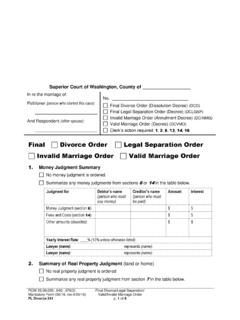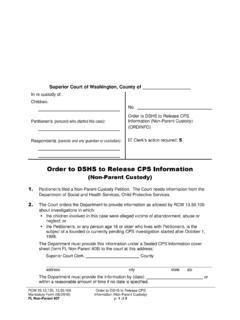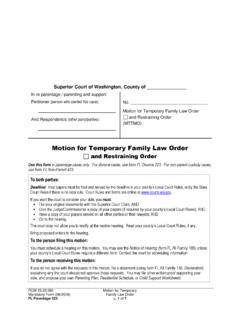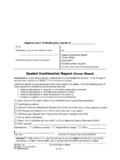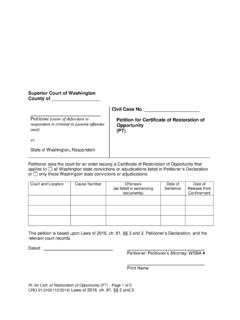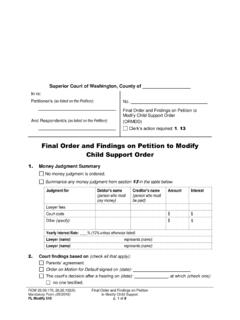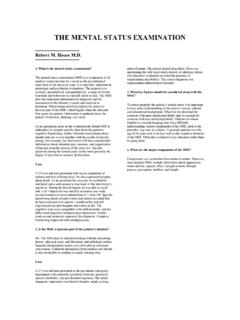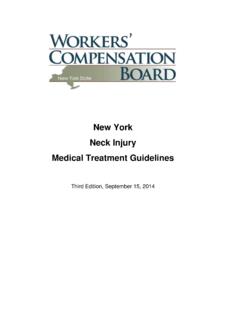Transcription of Domestic Violence Evaluations and Assessments1,2
1 DV Manual for Judges 2015 Washington State Administrative Office of the Courts Appendix A-1 APPENDIX A Domestic Violence Evaluations and Assessments1,2 Appendix A is an overview of issues3 related to Domestic Violence (DV) Evaluations that may appear before the courts: criminal, civil, family law, dependency, or juvenile courts. Specialized Domestic Violence Evaluations may have been requested by the court or introduced as part of the case by lawyers, professionals related to the courts, or the parties themselves. DV Evaluations may be a standalone evaluation or be a subset of another evaluation . I. Domestic Violence Evaluations are specialized Evaluations of Domestic Violence specific issues and are conducted using DV-specific evaluation protocols.
2 A. Domestic Violence Evaluations for court proceedings address a wide variety of questions4: Whether or not specific conduct that did occur fits the behavioral definition of Domestic Violence ? If the conduct is Domestic Violence , then who is the adult victim and/or who is the DV perpetrator of that conduct? 1 This appendix focuses primarily on Domestic Violence Evaluations /assessments of the perpetrator used in court proceedings; some of the comments and examples may also relevant to Evaluations for Domestic Violence adult victims and or their children. It is beyond the scope of this appendix to handle this topic in an exhaustive manner. It should be taken only as a primer for judicial officers, which highlights some of the dilemmas surrounding such Evaluations .
3 Also this appendix is limited to Domestic Violence Evaluations only and does not address issues related to other types of non- Domestic Violence forensic Evaluations , except where they specifically intersect with Domestic Violence Evaluations . For this discussion, the terms DV evaluation and assessment are used interchangeably. 2 See Chapter 2 for coverage of lethality assessments. That detail will not be repeated in this appendix; although, lethality assessment is always part of the Domestic Violence assessment. 3 There is little direct research on DV Evaluations or assessments protocols. What is presented in here is the consensus of experts in the field and based on the author s seminars for judges and publications: A.
4 Ganley, Domestic Violence , Parenting Evaluations , and Parenting Plans: Practice Guide for Parenting Evaluators in Family Court Proceedings (2009), available online through ; A. Ganley & M. Hobart, Social Worker s Practice Guide to Domestic Violence , Children s Administration, Washington State Department of Social and Health Services (2010, 2012R) 4 At the close of this appendix (pgs. 13-24) there are examples of questions that evaluators ask parties for purposes of conducting the evaluation and which judicial officers can also use in considering Domestic Violence in a specific case. DV Manual for Judges 2015 Washington State Administrative Office of the Courts Appendix A-2 If Domestic Violence has been or is present, what are the risks of future danger?
5 To whom? And by whom? (Assessment of lethality and dangerousness?) What have been the impacts/harms of Domestic Violence on the adult victim? What have been the impacts/harms of Domestic Violence on the children? How does the Domestic Violence affect the parenting of the adult victim? Of the Domestic Violence perpetrator? What ongoing or future risks of harm does the Domestic Violence perpetrator pose to the adult victim? To children? To others? Is the DV perpetrator amenable to treatment/motivated to change? Are there co-occurring issues for the DV perpetrator that may negatively impact treatment/change? For court review: has the Domestic Violence perpetrator stopped the pattern of assaultive and coercive behaviors?
6 Become a safe parent? A safe citizen? B. Multiple Evaluations in DV Cases: Not all Evaluations in Domestic Violence cases are DV Evaluations . There may be different types of Evaluations in DV cases. Sometimes a case before the court has multiple and competing Evaluations . Knowing the limitations as well as the strengths of the different Evaluations assists the judicial officer (1) in deciding which evaluation if any the court would order and/or (2) in understanding the relevance of DV Evaluations brought to cases. Behavioral assessment techniques have been shown to be critical for assessing Domestic Violence , which is a behavioral problem rather than a personality problem. Often mental health Evaluations (psychological or psychiatric ) do not include behavioral assessments of Domestic Violence conduct.
7 Therefore, they have limited value in addressing the standard questions before the court for DV cases: o Determining whether or not Domestic Violence occurred. o Determining who is or who is not a DV perpetrator (or DV victim). o Assessing impact of the entire pattern of assaultive and coercive behavior on the adult victim and children. o Determining future risks to adult victim. o Determining future risks to children posed by Domestic Violence . Mental Health/ psychiatric Evaluations . Standard mental health Evaluations focus on personality, motivation, cognitive psychological functioning, and use psychological tests and tools (see page 8 for cautions regarding psychological testing in DV cases) in addition to interviews.
8 psychiatric Evaluations do the above and include medical assessment techniques as well. Typically these Evaluations do not systematically gather the information regarding person s DV Manual for Judges 2015 Washington State Administrative Office of the Courts Appendix A-3 behaviors or conduct, which is standard procedure for a Domestic Violence evaluation . Standard mental health or psychiatric Evaluations do not provide the specific information needed for establishing a parenting plan or child welfare service plan, such as whether the party s mental health issue (or DV issue) affects their parenting capacities, whether the identified mental health (or DV issue) barrier to parenting are short or long term, and if the mental health (or DV issues are resolvable through specific conditions of the parenting plan or child welfare service.)
9 Substance Abuse Evaluations . These focus on assessing and individuals for substance abuse and or addition issues. There are standards for substance abuse Evaluations (including procedures and tests that may be used). They do not assess for co-occurring issues ( Domestic diolence, sexual deviancy, etc.). Sexual Deviancy Evaluations . These are similar to substance abuse Evaluations in that their purpose is to focus on one issue. This may be an appropriate evaluation as an adjunct evaluation when there are questions about a co-occurring issue of sexual deviancy. Parenting Evaluations : the focus of this evaluation is on assessing the specific parenting capacities of specific parents of specific children. There is a great deal of variety in how effective parenting Evaluations are for cases with Domestic Violence .
10 Traditional parenting evaluation protocols do not routinely screen for Domestic Violence and only address the issue if parents alleged Domestic Violence . Even then, they do not use behavioral assessment tools in the interviews with the parties. In addition, they frequently do not integrate standardized Domestic Violence assessment protocols in assessing identified Domestic Violence in the case. Both mental health and parenting Evaluations have other limitations in common: high cost, often difficult to obtain in communities, failure to address trauma, failure to assess Domestic Violence , and, too often, they are culturally or linguistically inappropriate. For Domestic Violence cases mental health Evaluations , parenting Evaluations , substance abuse, sexual deviancy Evaluations frequently fail to capture the specifics of the abuser s pattern of assaultive and coercive behaviors and the impact of that conduct on the legal questions before the court.



